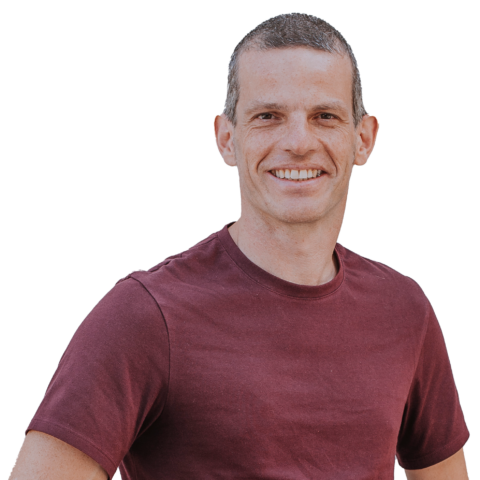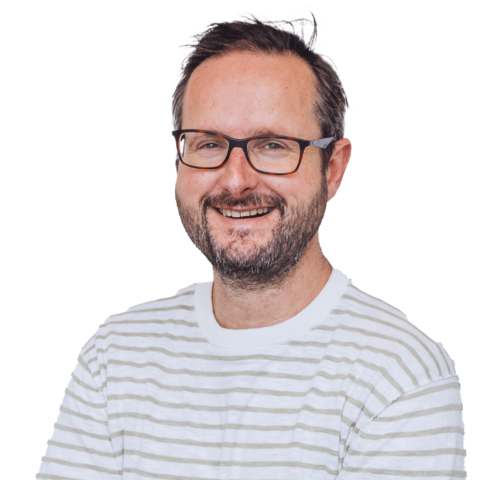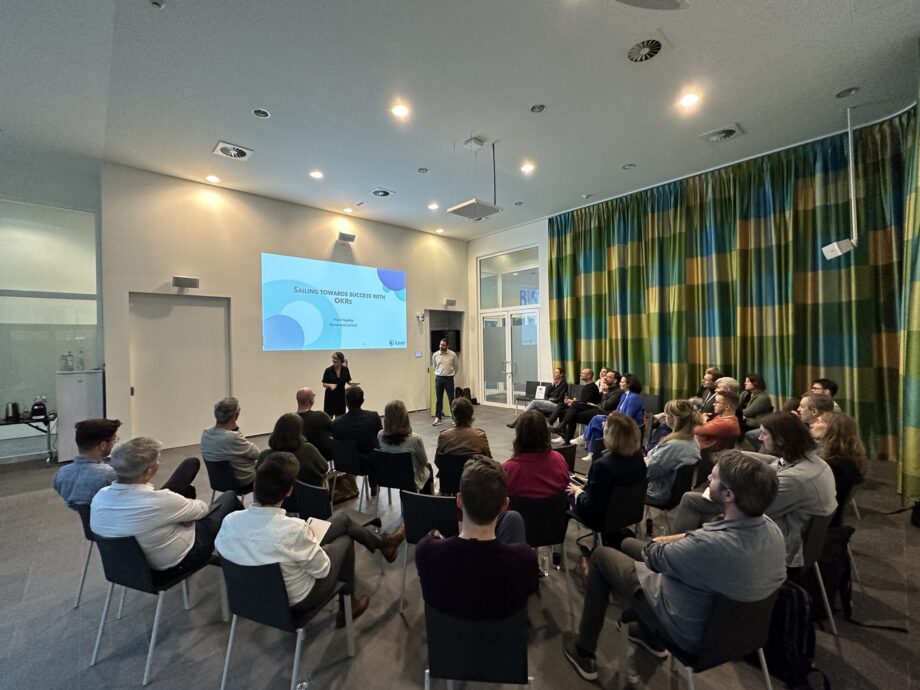On Tuesday, May 9th, we set up our Agile Kitchen at the Mediahuis headquarters in Antwerp for a joint session with Mediahuis on OKRs.
Are you curious about the main takeaways of an evening on this fascinating subject? You’ll discover them here!

Sailing Towards Success with OKRs
iLean’s Frank Geelen and Geneviève Loriaux kicked off the first part of the evening with a practical and concise introduction to OKRs. They touched upon the basics but also dug deeper into the subject.
First of all, it is essential to know that OKRs contain these three elements:
- Objectives
- Key Results
- Initiatives
But what is a good objective? It should definitely be inspirational and exciting, ambitious but also qualitative.
And what about the key results? They should enable you to understand the gap and visualize your progress, so they should be measurable, specific, and value-based but also time-bound.
The initiatives of your OKRs are your projects, stories, tasks, actions, …
“An idea without a plan is just a wish.”
Geneviève and Frank mapped these basic principles of OKRs onto a very concrete and very relatable example and set the audience to work!
What resonates more: losing weight or becoming the fittest version of yourself?
| Losing weight Eat healthier Increase sports activities Drink less alcohol | Becoming the fittest version of myself A resting heart rate of 50 Lose 10 kg in weight by the end of June Sleep 8 hours per night |
Did you notice that the ‘becoming the fittest you’ version does not contain actions but rather leading indicators?
This first part of the evening with Geneviève and Frank offered a very interactive introduction to OKRs. The audience got to work with concrete examples to develop practical insights on OKRs that go past the basic theory. They showed us how to ensure that using OKRs does more for you than becoming a mere tick in the box.
OKRs at Mediahuis
For the second part of the evening, Sarah Faict (Organisation Developer) and Stijn Vercamer (Product Director) from Mediahuis took over.

Mediahuis Belgium, a very well-known player in the media sector, takes pride in their independent journalism that really makes a positive contribution to people and society.
They recently reorganized their product team and switched to a way of working with OKRs. This process is an ever-ongoing process, and Sarah and Stijn explained their journey in more detail and gave an idea of where they stand at the moment.
iLean was fortunate to be allowed to help Mediahuis in this journey. iLean stepped in halfway through their OKR journey, and at the moment, the team felt stuck. iLean’s assessment midway through the process helped them overcome their hurdles and stimulated them to keep things pragmatic and manageable.
Why did Mediahuis want to start working with OKRs?
They needed a way to measure progress better and more transparently while establishing an actionable framework within the broader organization.
Before, KPIs were king at Mediahuis. Although these KPIs were known, they did not move or inspire people. As a result, they could not create the necessary focus for progress.
So they wanted to give OKRs a chance, a framework that restores ownership over output and outcome. And it took some time to understand the difference between them, namely:
- Outcome => what do we want to achieve; working deliberately towards a goal
- output => what do we do; working hard
Of course, this OKR journey was long and winding and brought hurdles to overcome, such as:
- OKRs are typically managed on a quarterly basis, but Mediahuis objectives turned out to have a longer lifespan, which conflicts with the quarterly cycle.
- the OKRs had to be balanced with the KPIs as this was still the framework most frequently used by many management teams.
- there was some erosion in the eagerness of the product management team to adopt another change after many reorganization efforts in recent years.
- thinking about objectives was a strenuous process, partly because of the internal pressure to do it (too) well.
Stijn and Sarah enthusiastically explained how they overcame these challenges, how Mediahuis made OKRs work for them rather than the other way around.
And how Mediahuis’s company culture, result and profit-driven, with a high focus on collaboration, was a significant contributing factor to the success of this OKR journey.
Elaborate Q&A
The evening was concluded with a very elaborate Q&A because participants couldn’t get enough of the subject.
Some of the questions that were discussed are:
- Does it happen that certain teams fail to see how they can contribute to the OKRs?
- What is the difference between fair share and KPIs?
- What happens if an OKR is not realized?
These and many more questions were addressed with Geneviève as the facilitator of the panel discussion.
Conclusion
It was yet again a very successful Agile Kitchen session where the theory was combined with practical examples and takeaways.
Are you eager to learn more about all things Agile and share insights with peers?
Check out our Agile Kitchen calendar so you can join our next sessions!



